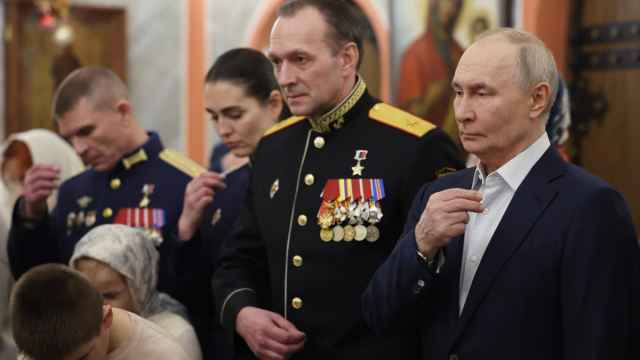There was far less anticipation leading up to President Dmitry Medvedev’s third state-of-the-nation address last week than there had been for the previous two. The first address was interesting precisely because it was the first and everyone wanted to know what the president would say.
Of the three speeches, the first one focused on political reform, albeit in very general terms. That led to increased expectations regarding the second address, but to no avail. Medvedev’s promise for change became a call for sweeping technological innovation, to which most Russians responded with indifference.
Finally, the third address unexpectedly reduced the state’s role to one of caring for the country’s children, although that care is probably more in the form of charity than social policy. Against the backdrop of the government’s continuing offensive aimed at the educational system, the call to take care of the youth comes across as demagogic, even if the speaker had only the best of intentions.
Judging by the responses in the blogosphere, the president managed to disappoint just about everyone. Liberals, in particular, expected more coherent political reforms and more concrete progress in terms of modernization. Prior to this address, Medvedev criticizing the existing single-party political system dominated by United Russia as being stagnant, but that had been his personal opinion. In the state-of-the-nation address, Medvedev exercised far greater restraint.
From Medvedev’s speech, one could conclude that the president’s modernization program consists of only two components: free markets and energy-efficient light bulbs. In reality, of course, there is no modernization program to speak of. Medvedev’s address contained the call for a new wave of large-scale privatization, a promise to accelerate Russia’s entry into the World Trade Organization and other strictly neoliberal proposals. But not a single word was said about the new law that will cut the level of social services across the board, particularly in the education and health care sectors.
It is therefore no surprise that most analysts — even those who are most sympathetic to the president and his political agenda — expressed only measured praise for his speech, while others expressed open disappointment and bitterness. But in the end, is it worth getting so upset over a presidential address?
In Russia, the main political struggles do not play out on center stage, but behind the scenes. Rumors are more important than declarations, and silence often speaks more eloquently about the intentions of the authorities than loud public statements. In that sense, the rumors circulating in Moscow about the escalating conflict among Kremlin clans are far more important than what Medvedev said in his address.
When Medvedev spoke about children being the future of the country, he clearly lost sight of the fact that when the next generation of Russians reach adulthood, they will judge the Medvedev legacy not by his speeches about the importance of childhood, but by the real state of the economy and the quality of life that they inherited from his presidency.
Boris Kagarlitsky is director of the Institute of Globalization Studies.
A Message from The Moscow Times:
Dear readers,
We are facing unprecedented challenges. Russia's Prosecutor General's Office has designated The Moscow Times as an "undesirable" organization, criminalizing our work and putting our staff at risk of prosecution. This follows our earlier unjust labeling as a "foreign agent."
These actions are direct attempts to silence independent journalism in Russia. The authorities claim our work "discredits the decisions of the Russian leadership." We see things differently: we strive to provide accurate, unbiased reporting on Russia.
We, the journalists of The Moscow Times, refuse to be silenced. But to continue our work, we need your help.
Your support, no matter how small, makes a world of difference. If you can, please support us monthly starting from just $2. It's quick to set up, and every contribution makes a significant impact.
By supporting The Moscow Times, you're defending open, independent journalism in the face of repression. Thank you for standing with us.
Remind me later.





